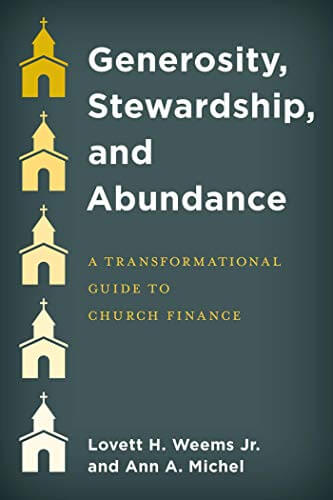I pastor a church that believes in the power of fundraisers. Over the decades, Beulah African Methodist Episcopal (AME) Church, a historic congregation in rural South Carolina, has built new church facilities, maintained operational funds, purchased land, and funded new ministries through fundraisers. Last year, 35 of 52 Sundays involved appeals for extra giving not associated with tithes, offerings, or benevolent giving. And over half of the church’s contributions came from the fundraising efforts of various organizations and ministries. But the congregation had become so focused on the next fundraiser, there was little opportunity to practice a more spiritually motivated approach to stewardship.
Working with a group of church leaders, I came to see that this approach was deeply ingrained in the congregation’s culture — a culture that viewed financial stability as dependent on rallying the congregation to give to special financial causes, encouraged competition between various church groups, and motivated giving by publicly recognizing major contributors. These stewardship practices had developed over the years and had sustained the church over many decades. But they no longer sufficed given current economic challenges. More importantly, God was missing from the equation. The congregation needed to adopt a more biblical approach to giving to God.
I knew that redirecting the congregation’s giving pattern from one of appeal and response to one of spiritual and covenantal stewardship could not happen overnight. But I could begin by taking one faithful step. So with the support of a core group of leaders, I launched a “stewardship intervention.”
The intervention consisted of a series of midweek Bible studies and Sunday sermons exploring the human-Divine relationship, focused on the following topics: 1) Connection to God: Understanding the connection between God and ourselves; 2) God’s Property: Determining what belongs to God and what belongs to us; 3)Worshipping God: Cultivating an understanding of the covenantal importance of worshipping God; and 4) Giving to God: Connecting the essential element of worship with sacrificial giving.
God was missing from the equation. The congregation needed to adopt a more biblical approach to giving to God.
The focus was on sharing God’s narrative with the members of Beulah AME. A better understanding of God’s story enabled the members to appreciate God’s intent for a special relationship with each person. Through this project, the congregational stories of the members were personally connected to God’s story. This connection has encouraged positive change in every individual’s response to God’s expectations — and, as a result, in the entire congregation.
As we moved through the four weeks of studies and sermons, it became increasingly noticeable that the members were open to thinking differently about their stewardship practices. The problem was they had not previously been given enough instruction on covenantal theology and its relationship to financial stewardship.
The project has produced both spiritual and tangible results. As the members of Beulah commit to change their stewardship practice, their giving patterns have begun to shift from situational giving to a more frequent and consistent pattern of giving. There has been a 200 percent increase in Bible study attendance as well as a slight increase of attendance in morning worship, which is usually well attended. Two months after the intervention, there has been a steady increase in attendance and giving. And the atmosphere continues to be charged with positive energy.
In Stewardship for Vital Congregations, Anthony Robinson indicates that persistence is essential in implementing change in stewardship practices. Robinson writes, “Often in the stewardship area we imagine that doing things differently for one year will result in complete and lasting change. Forget that. Congregations have a tremendous capacity to settle back into what they have long known and been comfortable with. You should be prepared to work at stewardship over a longer term and to develop a practice that is sustainable.”
This project has convinced me that when congregants understand the genuine connection between God and themselves, they accept their responsibility as personal rather than institutional. And giving becomes a part of God’s vision rather than meeting budgetary needs. While persistence will be essential to sustaining these practices, Beulah AME has taken a first, faithful step in that direction.
This article summarizes work done for a project thesis submitted in candidacy for the degree of Doctor of Ministry in Church Leadership at Wesley Theological Seminary.
Related Resources:
- Theology of Stewardship and Biblical Generosity Resource
- From Fundraising to Stewardship by Janet T. Jamieson and Philip D. Jamieson
- Connecting Generosity to Faith by David McAllister-Wilson
- Giving Up to Our Potential by Ann A. Michel







